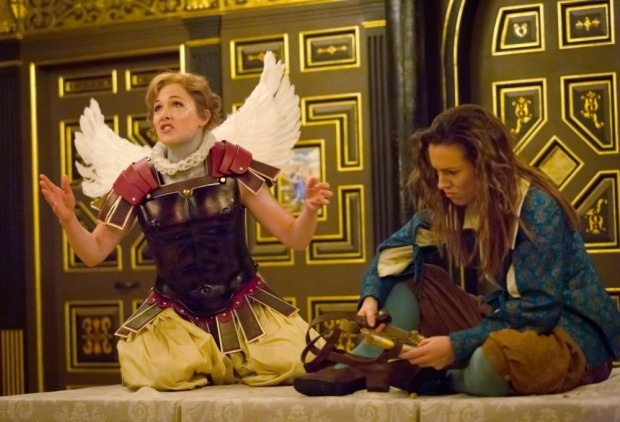Orpheus (Sam Wanamaker Playhouse)

© Stephen Cummiskey
By rights this one should be called 'Eurydice', since Francesco Buti's libretto fleshes out the bones of the story with an elaborate narrative that gives pride of place to the heroine.
In most tellings, the oft-spun tale of a musician who goes down to the underworld in order to reclaim his dead bride rarely focuses on the lady. Orpheus, though, puts her centre stage and gives Louise Alder the meatiest role of all – and she eats it up. Wonderfully passionate in her anger towards Aristeus, the thwarted suitor who poisons her, this committed singing actress is a special communicator as well as a radiant soprano. Her death aria is deeply moving and transcends the indulgences of Christopher Cowell's translation.
Stricken with a throat infection, Mary Bevan mimed the title role on opening night while Siobhan Stagg sang stylishly from the gallery, her lament "Come, my tears! Why no weeping?" especially touching. Together they made an engaging team; there were times when you couldn't see the join. (In coming performances the Australian soprano will assume the role onstage until Bevan's return, currently scheduled for 4 November.)
'Neat visual tricks'
Unusually for our era, there are no countertenors among the cast. All Rossi's castrato roles are sung by women and every one of them is a gem. Caitlin Hulcup is a fiery, passionate Aristeus; Jette Parker Young Artists Lauren Fagan, Jennifer Davis and Emily Edmonds a sublimely consonant three Graces. Of the rest. Keri Fuge's tinker of a Cupid is an especial delight, her every appearance signalled by an improbable pair of white wings ("I wear them for decoration").
Curnyn draws glorious colours from his orchestra and makes the ten-strong period band sound like a parallel aural universe. The score itself is a panoply of musical delights: Curnyn easily convinces me that this Orpheus (Orfeo in the original, an appellation the Royal Opera may have resisted in order to avoid confusion with Monteverdi) is a masterpiece.
The candlelit Sam Wanamaker Playhouse weaves its spell even while a dozen warbling grown-ups writhe and clamber all over it. If Keith Warner's direction tries too hard to entertain, at least it's never dull; he and designer Nicky Shaw squeeze every conceivable use from the tiny performing space with some neat visual tricks along the way. Watch out for les trois cloches.
Warner is inspired by the space to play both with and against the music's courtliness. His vein of mischief works well for some (the plot requires an imperious Sky Ingram to share the role of Venus with a cackling Mark Milhofer – both are divine) but less so for others, although it's hardly Graeme Broadbent's fault that Cowell reserves lines like "Let Orpheus wed the Naiad I 'ad" for his over-vernacular Satyr. It's a matter of taste, of course – but really. If it ain't Baroque don't fix it.
Orpheus runs in repertory at the Sam Wanamaker Playhouse, Shakespeare's Globe, until 15 November.










